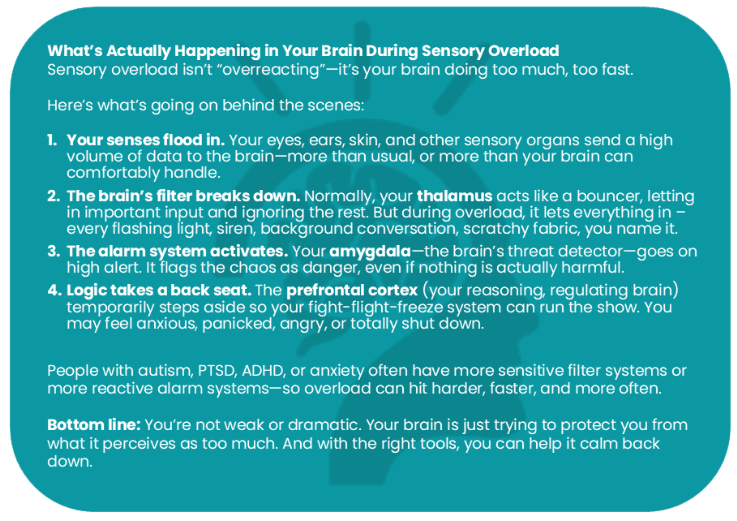
How to Stay Calm When Your Senses Are Over It (Fireworks and Beyond)
July 4th already? Strike up the band and cue the fireworks!
For a lot of people, fireworks are festive, nostalgic, and a highlight of summer. But for others, especially those with PTSD, autism, or sensory sensitivities, this time of year can be difficult. If that’s you, or someone in your family, you’re not alone.
It turns out that about 15–20% of the U.S. population are considered individuals with sensory processing sensitivity (SPS). This population usually includes Americans with PTSD, autism, and those who simply have a heightened sensitivity to sensory input (it is often genetic). That’s roughly 50 to 66 million Americans in 2025!
People with SPS may:
- Notice subtle changes in their environment
- Feel overwhelmed by bright lights, strong smells, or loud noises
- Be deeply affected by others’ emotions
- Need more time to process information and recover from stimulation
If that sounds like you — or someone you love — it helps to plan ahead. Having a few tools ready can make a big difference, both for the sensory overload you expect and the surprises you don’t. Whether your neighborhood turns into a war zone this time of year or you’re heading to a fireworks show with your kids, a simple plan can help you avoid getting overwhelmed — and bounce back faster if you do.
If You Can’t Escape the Holiday Noise…
- Prep yourself (or your family member) for what’s coming.
Talk about it ahead of time. Describe what fireworks look and sound like — bright flashes, loud bangs, and big crowds. For kids, you might use a “social story” or watch a fireworks video at a low volume to desensitize them in a controlled setting.
- Use noise-canceling headphones or earplugs.
These aren’t just helpful — they’re a game-changer. Many people find that the intensity of fireworks becomes tolerable (or even enjoyable) when the noise is reduced.
- Reduce visual input.
Sunglasses or tinted glasses can soften the impact of bright, flashing lights. Watching fireworks from indoors (through a window or from inside your car) can also help block out some of the chaos.
- Choose your viewing spot wisely.
If you’re attending a public show, sit farther away from the launch site. The view is still great — and you’ll experience less noise and fewer crowds. If you’re staying home, pick a “safe zone” in your house that’s insulated from outside noise.
- Pack your comfort tools.
Weighted blankets, fidget toys, calming scents, a favorite stuffed animal — these aren’t just for kids. Anyone can benefit from bringing a few items that help regulate the senses.
- Practice calming techniques in advance.
Deep breathing, grounding exercises, and simple mindfulness techniques can help soothe the nervous system. For example, try the “4-7-8” breathing method: inhale for 4 seconds, hold for 7, exhale for 8.
- Give yourself permission to leave.
Whether you’re at a park, a party, or your in-laws’ backyard — have an exit plan. Park your car where you can leave easily. Let your family know ahead of time that you might dip out early. It’s not rude — it’s protective.

When Sensory Overload Comes Out of Nowhere
Not all triggers come with warning signs. A fire alarm in a public building. A blaring siren. A surprise strobe light at a concert. Even a crowded grocery store on a bad day can hit the wrong note.
Here’s how to plan for and handle unexpected sensory overload when it sneaks up on you:
- Figure out what sets you off.
You may not be able to avoid all your triggers but “officially” recognizing them can help you prepare. If bright lights, loud noise, or chaotic crowds are too much, make a mental note. Or better yet, write it down.
- Carry a sensory emergency kit.
Keep a small pouch in your bag or glove compartment with earplugs, sunglasses, a fidget item, a calming scent (like lavender), or even gum. You might not need it often — but when you do, you’ll be glad it’s there.
- Step away if you can.
Move to a quieter space, even if it’s just a bathroom stall, a hallway, or your parked car. The faster you reduce stimulation, the quicker your system can reset.
- Limit what’s coming in.
Cover your ears with your hands. Close your eyes or put on sunglasses. Focus your attention on one calming object — your shoe, your keys, the floor — to block out the rest. - Use grounding techniques.
Try the 5-4-3-2-1 method by identifying:
5 things you see 4 things you can touch 3 things you hear 2 things you smell 1 thing you can taste
This simple trick can pull your brain back to the present and interrupt panic signals.
- Breathe. Seriously.
It sounds cliché, but it’s scientifically sound. Deep, controlled breathing sends a message to your brain that you’re not in danger. Try 4-4-6 breathing — breathing in through your nose for 4 seconds, holding for 4, then exhaling for 6.
- Talk to yourself (calmly and kindly).
Remind yourself that even though you feel panicky and uncomfortable, you are safe. Tell yourself that the misery will end and you will emerge unharmed.
- Let someone know what’s happening.
If you’re with others, use a simple phrase like “I need a break” or even a nonverbal cue. Having someone who understands can help you feel safer and less alone.
The key is to have a plan and to practice your chosen techniques ahead of time. That way those coping tools will be available to you when you need them.
The Bottom Line
You don’t have to love fireworks. Or crowds. Or sirens. But you can have tools, strategies, and plans that can turn an overwhelming situation into one that feels more in your control. Independence Day is a great time to plan ahead. After all, there’s a lot of freedom in not having to worry about sensory assaults.
So, whether you’re bracing for July 4th, or just trying to get through a loud Tuesday at the grocery store, take care of your senses. They’re trying their best to protect you.
At Amaze, we’re proud to be your healthcare partner. We’re always here to help when you need us.